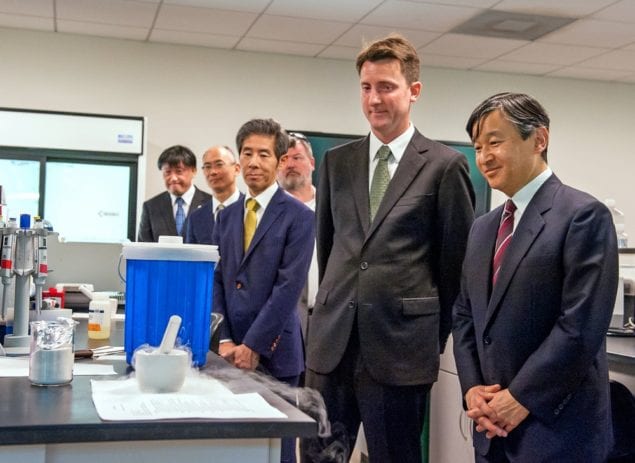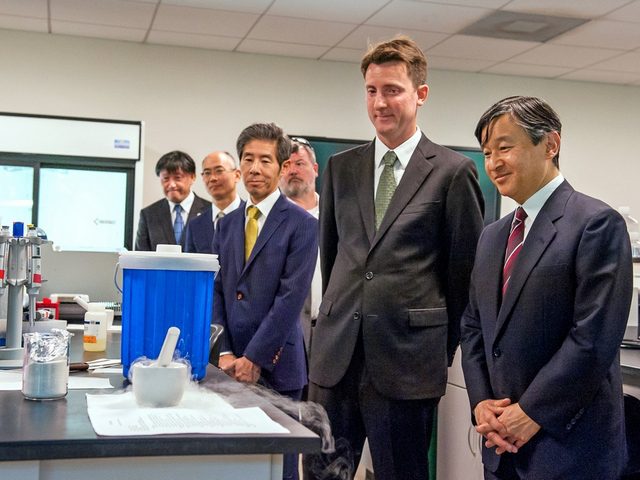
Naruhito, Crown Prince of Japan Kōtaishi Naruhito Shinnō, the elder son of Emperor Akihito and Empress Michiko, visited Fairchild Tropical Botanic Garden on Mar. 17, to tour three state-of-the-art facilities including the Wings of the Tropics butterfly exhibit; Baddour DNA Laboratory, and view experiments underway in Fairchild’s “Growing Beyond Earth Program,” its partnership with NASA to discover edible space plants.
“It was the highest honor to have hosted the Crown Prince at Fairchild and share his enthusiasm for the beauty of botanical gardens, their place in society and the endless possibilities being identified today involving the science of botany,” said Carl Lewis, PhD, Fairchild’s director.
The Crown Prince’s educational tour began at the Paul and Swanee DiMare Science Village which houses the Wings of the Tropics butterfly exhibit and metamorphosis laboratory, as well as the Baddour DNA lab. After seeing first hand a spectacular butterfly release of butterflies from Central America and South America in the Wings of the Tropics exhibit’s Japanese-inspired design, the Crown Prince remarked, “It reminds me of Ryōan-ji, except the stones are plants.”
The Ryōan-ji garden is considered one of the finest surviving examples of kare-sansui in Japan (dry landscape). Ryōan-ji is a refined type of Japanese Zen temple garden design generally featuring distinctive larger rock formations arranged amid a sweep of smooth pebbles (small, carefully selected polished river rocks) raked into linear patterns that facilitate meditation.
At the Baddour lab, the Crown Prince engaged students in the lab about their research studying the genetics of a rare palm tree to find new strategies to conserve it. A working and teaching space, current projects at the Baddour DNA lab include research on the diversity of mangos and related Southeast Asian fruit crops, the genetics of Caribbean palms on the brink of extinction, the genetics of rare orchids in South Florida and the evolution of plants within tropical island systems.
Another tour was conducted of the research and experiments underway to identify edible space plants as part of Fairchild’s “Growing
Beyond Earth” project in partnership with NASA. Through its award-winning Fairchild Challenge multi-disciplinary educational program, scientists and educators at Fairchild and NASA are administering plant experiments with participating middle and high school students to determine which edible plants may be suitable for growth in microgravity aboard the International Space Station’s plant growth facility, Veggie.
The traditional Japanese garden is considered one of the most important elements of Japanese art and culture. Each type of garden has its own beauty from botanical gardens to historic temples and shrines which are decorated with beautiful gardens. There are approximately 71 significant botanical gardens and arboretums in Japan, with several in Tokyo and Kyoto.
The Wings of the Tropics exhibit in the Clinton Family Conservatory is filled with hundreds of spectacular butterflies year-round. Exotic, artful butterflies like the heliconids, morphos and owl butterflies from Central America and South America perform their aerial displays of wonder. These butterflies represent about 40 different species at a time, creating a living rainbow.
Adults, children and families marvel with pure delight at the Wings of the Tropics, truly a one-of-a-kind experience, enhanced further by a stunning display of tropical plants and orchids.
With a focus on preserving the biological diversity of the tropical world, Fairchild’s Science Village serves to inspire future generations of scientists and nature lovers alike by developing an educational pipeline that will span from pre-school all the way to graduate school and beyond.
With more than 100 acres of beautiful gardens and farmland, Fairchild is home to the most important palm and cycad collection, rare plants, tropical fruit trees, the largest mango collection in the world and some of the most endangered tropical plants in the world.
Fairchild continues to propagate millions of native orchids in its Micropropagation Lab in the Science Village through an initiative known as the Million Orchid Project, the first project of this kind in the United States. To date, Fairchild has reintroduced thousands of several orchid species into the urban landscapes of Miami and its surrounding neighborhoods with the purpose of restoring both native orchids and the insects that pollinate them.
Established in 1938 and comprising 83 acres, Fairchild Tropical Botanic Garden is a 501(c)(3) non-profit organization dedicated to exploring, explaining and conserving the world of tropical plants. The world-renowned plant collections feature palms, cycads, orchids, tropical fruit trees and more.
Fairchild has the largest education program of any metropolitan area, reaching more than 200,000 schoolchildren each year with environmental programs like The Fairchild Challenge. It aims to inspire a greater knowledge and love for plants and gardening so that all can enjoy the beauty and bounty of the tropical world. Special events include Chocolate, Mango, and Orchid Festivals in addition to an annual art exhibition, concerts, plant sales and more.
For more information, visit www.fairchild.org.






